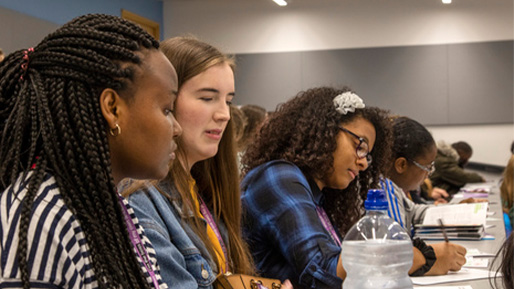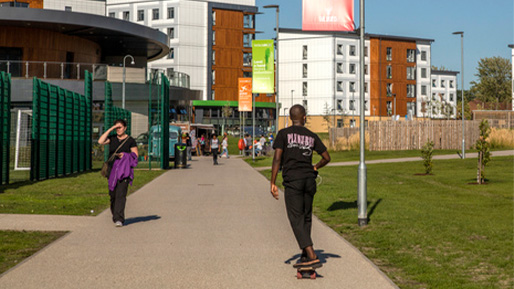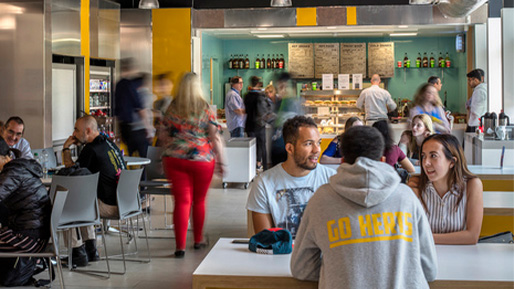
BSc (Hons) Economics and Finance
Explore modern economics and its application to financial systems and organisations in this versatile degree. Develop economic and financial knowledge alongside analytical, qualitative, and predictive skills.
-
Typical offer: 120–128
Entry requirements -
Fees: £9,535 per year (UK)
Full details -
UCAS code: L1N3
-
Course length: Various
Find out more -
Location:
- University of Hertfordshire, Hatfield
-
Institute code: H36
-
Work placement option
Find out more -
Study abroad option
Find out more
Economics Scholarship
£2,000 scholarship available with the ‘Economics’ scholarship.
Course overview
Learn about the constantly evolving financial sector, within the wider, more philosophical, context of economics. Discover how financial markets work, the psychology behind finance, and how companies get funding.
Explore modern and traditional economics and their application to organisations, as you learn about financial markets and economic theory. Look at how economists think, analyse, and solve problems.
Discover how to predict personal finances, organisational and national budgets. You'll also discover how every decision matters, from political problems to business operations and our lifestyle choices.
As you work on solving problems and thinking critically, improve your quantitative and data analysis skills. Practise how to explain your findings and conclusions clearly, which is an important skill to have in business.
Explore ways of addressing real-world problems from a financial, ethical and economic perspective. Learn to be an independent thinker, communicate well and solve problems effectively.
Prepare yourself for a career in banking, insurance, pension funds, investment and unit trusts, stock brokerage, or financial advisory.
Improve your CV by participating in industry placements, studying abroad, or doing internships. Try out the latest online bite-sized digital experiences to gain more experience.
These activities will all support you in your career preparation.
*based on an average of questions 1-25 of the NSS survey 2023.
Why choose this course?
Go beyond theory, with stimulating discussions on traditional and non-conventional economic approaches, and how finance affects the health of an economy.
Learn how to analyse, evaluate, and predict economic and financial situations. This will help you develop important skills that will be useful in your future career.
Gain highly desirable transferable skills, including problem-solving, communication and critical thinking. These will all help you find work in a variety of fields.
In the finance group, we all have similar values and goals. This is really important for both your success and ours. It helps us support you in reaching your full potential.
Enjoy co-curricular opportunities to further enhance your career prospects. Participate in the national University Business Challenge or become a member of our Enactus society, working on projects that make a positive impact on society.
We are a business school that focuses on careers. We have good relationships with professional groups and businesses and invite them to networking events or as guest speakers.
Students feel supported; a previous graduate comments: “Overall, without the support from lecturers and the programme leader I would not have had such a positive university experience nor gone onto a masters. The staff made me realise my potential which I then unlocked “ (Urvish Patel, 2019).
If you have a keen interest in financial markets, you may also like our BA (Hons) Finance. For those interested in the corporate sector, our BA (Hons) Business and Finance may also appeal to you.
Professional accreditations
We don’t deliver a finance program tailored to any one professional body, because we offer a course with flexible pathways providing you with greater versatility in your professional choices.
Your future career
Equip yourself with a wide range of commercial and analytical skills and expertise needed to develop a successful career in the finance and economics sector on this versatile course. Over 95% of students go on to work or further study (Graduate Outcomes, 2018-20).
Possible roles of employment include:
- Securities agent
- Data analyst
- Auditor
- Actuary
- Policy analyst
- Financial analyst
Join graduates who have gone on to work in a variety of roles at organisations such as Citibank, UCAS and Mercer & Hole.
This relevant, modern course will ensure you have the skills and knowledge to work for both local and international organisations. Enhance your work-related skills such as teamwork, analytical thinking and presenting information then put them into practice, and boost your CV.
What you'll study
Your first year builds a solid foundation of knowledge in financial principles and economic theory helping you to build a general understanding of finance in the context of society and introducing macroeconomics and microeconomics.
In your second year, develop the necessary analytical and professional skills to prepare you for work, improving your productivity and ability to contribute to organisations. Explore essential elements such as business ethics, econometrics, consumers and firms.
In your final year, take on real-world challenges as you put your knowledge to the test. There are also a wide number of optional modules so you can tailor the course to areas of interest with topics such as behavioural finance, public finance or modern econometrics.
Throughout, we promote team working skills, instilling in people and organisational skills alongside your analytical and financial expertise.
There are also opportunities to further enrich your personal development through our GoHerts program, placements, internships, study-abroad and Future Success team events.
What if I need support?
You'll benefit from an academic support team, wellbeing team and a personal tutor to help you adjust to the demands of university learning and living.
Additional support is available from our Student Success team focused on inclusive learning and our dedicated Future Success network who will help you with work experience, placements and graduate jobs.
You can also join and reach out to the Business School Student Voice community, a team of student representatives who regularly meet with staff to provide feedback and ensure teaching remains effective.
Our in-house Centre for Academic Skills Enhancement (CASE) is open to all Business School students, for extra support with academic writing, numeracy and referencing.
Optional sandwich year
At the end of your second year, you have the option to experience a year of working life with a placement, or a shorter internship, a huge CV booster!
Professional work experience is the biggest contributor to your future employability. It allows you to put your knowledge into action while learning how a business operates and making some handy professional connections.
We'll help you make the most of the experience, holding your hand from start to finish. You also get assistance with your CV, plus help preparing for interviews and presentations, at our groundbreaking mock Assessment Centre Experience.
Students on the programme have recently had the opportunity to work at Avnet, Balfour Beatty, Hertfordshire County Council, Network Rail and the NHS.
You can take a sandwich year abroad, making that decision in your second year. Studying at one of our international partners is a huge personal development opportunity and an amazing experience.
More and more companies are now working internationally, the experience of living in another country will make a great impression on future employers. Put knowledge into action, learn how a business operates and make professional connections.
With over 100 partners in 40 countries, the world really is your oyster! Our dedicated study abroad office advises you on your options, to help you make the most of this opportunity.
If you study abroad between your second and third year of study, you’ll pay no tuition fee, either to the partner university or us.
At the end of your second year, you have the option to experience a year of working life with a placement, or a shorter internship, a huge CV booster!
Professional work experience is the biggest contributor to your future employability. It allows you to put your knowledge into action while learning how a business operates and making some handy professional connections.
We'll help you make the most of the experience, holding your hand from start to finish. You also get assistance with your CV, plus help preparing for interviews and presentations, at our groundbreaking mock Assessment Centre Experience.
Students on the programme have recently had the opportunity to work at Avnet, Balfour Beatty, Hertfordshire County Council, Network Rail and the NHS.
Find out more about work placementsYou can take a sandwich year abroad, making that decision in your second year. Studying at one of our international partners is a huge personal development opportunity and an amazing experience.
More and more companies are now working internationally, the experience of living in another country will make a great impression on future employers. Put knowledge into action, learn how a business operates and make professional connections.
With over 100 partners in 40 countries, the world really is your oyster! Our dedicated study abroad office advises you on your options, to help you make the most of this opportunity.
If you study abroad between your second and third year of study, you’ll pay no tuition fee, either to the partner university or us.
Find out more about study abroad optionsWhere you'll study
You'll be taught on our modern de Havilland Campus, with our 24/7 Learning Resources Centre, offering open and private study spaces. You also get online self-study materials to further support you.
There are dining options, a bar, and a recreational space on campus where you can shoot some pool or play video games. It also houses Hertfordshire Sports Village, featuring a gym, swimming pool, coffee shop and climbing wall.
Discover the Enterprise Hub, a vibrant destination where local firms and students work and learn in comfort.
The Student Union bar and additional facilities are only a 20 minute walk (or short bus ride) away at our second campus, on College Lane. Student housing is available at both campuses.
A train to central London takes just over 20 minutes, and you are also conveniently located on the A1(M) with access to the road network, making travel quick and convenient.
Who you'll learn from
Your team includes experienced academics, researchers and consultants alongside guest lecturers from the industry, many of whom are alumni.
Economics staff interests include business economics, the economics of organisation and innovation, game theory, social choice theory, behavioural economics and political economy.
The team has an interest in the power of economics with its fusion of ideas and approaches, to improve lives and societies and meet the challenges of the modern world.
Your finance experts include experienced lecturers, researchers and consultants. They have undertaken consulting and research projects associated with capital market relative performance measures, investment portfolio management and internal performance audit amongst other topics.
Research interests include behavioural finance, experimental finance and household finance and there are authors of published research papers in these areas in peer-reviewed ABS ranked journals.
Check out our student blogs
How we support our students
At the University of Hertfordshire, we want to make sure your time studying with us is as stress-free and rewarding as possible.
We offer a range of support services, from childcare to counselling, ensuring that you make the most of your time at Herts and can focus on studying, having fun, and have the support you need.

Student Blogs
Kayleigh - Week at a glance
My week at a glance
At the beginning of each week, I write up my lecture PowerPoints ready to take with me to my lectures so I can add notes to it during the lecture. I find that writing up my lectures helps me to take in the information given to us. I tend to do my reading in bits throughout the week to help break it up, but I make sure it’s done before I go to the relevant lecture. I find doing this betters my understanding of the topic that is going to be covered in that lecture!
For each Accounting module, I had an hour lecture and an hour seminar each week! For French, I had a two-hour lectorial, which is a lecture and seminar in one session! I went into university three days of the week for lectures and seminars; I had two days at home!
Towards the end of October, assignments start to get set so you have a lot more work to be doing. I like to start the research for my assignments when they get set. Don’t leave them until the last minute, you’ll do much better when you have time to think about what you’re going to write! Managing your time between assignments and work for your lectures can be difficult but if you make yourself a plan, you’ll be fine!
I lived at university, so I also had to find time to get my weekly food shop. I tended to go on one of my days off in the morning and then in the afternoon, I could get back to my uni work! I would also work for the university on open days and other events as a student ambassador, so I also had to factor that into my schedule. You need to make sure you have some time for yourself so you can wind down, you don’t want to overload yourself! I like to spend a day of the weekend watching Netflix or meeting up with friends!

Student Blogs
Kayleigh - Things you should know
Things you need to know before studying Accounting at Herts
There can be some preconceptions of what accounting is; it is NOT all maths! There is a lot of maths involved in the course, but it is not complicated maths so don’t worry, there is also a lot of written aspects too. There are several types of accounting ranging from financial to management accounting, all of which you cover over the three-year course! All the lecturers are qualified accountants, and most have worked in the industry for a significant amount of time and they have so much information for you. They’re always willing to help you as much as they can!
With any degree, there is a lot of reading. You use a different textbook for each module, and they set reading weekly for you. Most of the textbooks are on the online library and so are free to access so don’t go buying the textbooks straight away. For certain modules, doing the reading helps deepen your understanding of the topic significantly. For me, doing the reading for my Taxation module helped me to better understand the topics we studied but don’t try to do it all at once because you won’t take any information in. Remember to break it up so you don’t overload yourself!
You will be assessed in both exams and assignments for the course. Your assignments can range from an essay or a report but could also be a presentation in a group. Most modules have a mixture of exams and assignments so don’t stress too much about doing exams because you have your assignments to fall back on if necessary.
I would highly recommend that future students research what a chartered professional qualification is and the different bodies that offer them. Once you complete your degree in accounting it does not mean that you are a fully qualified accountant; you will need to complete a chartered qualification. The University offers a different amount of exemptions upon completion of the course from ACCA (Association of Chartered Certified Accountants), ICAEW (Institute of Chartered Accountants in England and Wales) and CIMA (Chartered Institute of Management Accountants). In your first year, ACCA comes in for a highly informative talk. In this talk, they encourage you to sign up to their ACCA accelerate scheme. I would highly recommend this, the cost savings for yourself in the future is beneficial. They also send you emails keeping you up to date with everything that’s going on.
Accounting can be a difficult degree but don’t stress. Planning your time wisely and being organised with assignments will make an enormous difference. Don’t forget to enjoy your time at university and make as many new friends as you can! Good Luck!

Student Blogs
Kayleigh - Why I chose Herts
Why I chose Herts
The first reason being that Herts had the perfect course for me, Accounting with French. Herts allows you to do a language alongside a business degree which not that many other universities offer! Not only do I receive several exemptions from my professional accounting qualification, but I also got to continue studying French, which is something I really enjoyed at college and wanted to continue at university!
Herts is remarkably close to London but it’s not in London. This is perfect for me because I moved from living in a village in the countryside to quite a busy town! I come from north Lincolnshire so Herts is also far enough from home that I would have to be completely independent but not too far that it would take me all day to travel home. Well a three-hour drive to me isn’t that bad anyway. I have lived in halls and off-campus for all three years of university! This has allowed me to meet so many people and some of my best friends! Also, this meant that I was never more than a five-minute walk from the Learning Resource Centre (LRC) on campus that is open 24/7, great for when you have deadlines looming.
When I visited Herts for the first time on my applicant day, I had the best day! I met three of the lecturers that have taught me over the past three years of university, which was reassurance the lecturers were lovely! My French teacher was so encouraging and excited! When I started in September there were only five people in my French class, so it was very one to one which was so beneficial to me overall!
I know that moving away from home for the first time can be very daunting, but don’t worry! Everyone in your halls is in the same boat! Go out and enjoy freshers! Order takeaways together and get to know each other! It will be one of the best things you do! My self-confidence has improved so much because I went to university!
Entry requirements
The University of Hertfordshire is committed to welcoming students with a wide range of qualifications and levels of experience. The entry requirements listed on the course pages provide a guide to the minimum level of qualifications needed to study each course. However, we have a flexible approach to admissions and each application will be considered on an individual basis.
| Typical offer (UCAS points) | 120–128 |
|---|---|
| Typical A Level offer | BBB–ABB |
| Typical IB offer | 120–128 |
| Typical BTEC offer | DDM |
| Typical T Level offer | Design Survey and Planning for Construction; Design Production, Design and Development; Education and Childcare; Healthcare Science; Health; Science; Digital Support Services; Digital Business Services; Onsite Construction; Building Services Engineering for Construction; Accounting; Design and Development for Engineering and Manufacturing; Engineering, Manufacturing, Processing and Control; Finance; Maintenance, Installation and Repair for Engineering and Manufacturing; Management and Administration; Agriculture, Land Management and Production; Legal Services. |
| GCSE | Grade 4/C in English Language and Mathematics. |
| Access courses | 120–128 |
| Additional information | Find out more about our standard and contextual Undergraduate Entry Requirements. |
| English language | All students from non-majority English speaking countries require proof of English language proficiency, equivalent to an overall IELTS score of 6.0 with a minimum of 5.5 in each band. If you do not have the required IELTS or equivalent for direct entry on to your degree programme, our Pre-sessional English and International Foundation courses can help you to achieve this level. |
|---|---|
| Additional information | Find out more about International Entry Requirements. |
Ready to apply?
UK and EU applicants with pre-settled/settled status in the UK
| Start date | Study type | Apply |
|---|---|---|
| September 2025 | Full time | Apply via UCAS |
| Full time with placement year | Apply via UCAS | |
| Full time with study abroad year | Apply via UCAS |
International and EU applicants without pre-settled status in the UK
Fees and funding
At Herts, we’re dedicated to providing world-class teaching supported by industry-level facilities and incredible social spaces. We believe cost shouldn’t be a barrier to higher education, and we strive to keep both our standard and additional costs as low as possible.
Economics Scholarship
£2,000 scholarship available with the ‘Economics’ scholarship.
| Study type | Fees | |
|---|---|---|
| UK students | Full time | £9,535 for the 2025/2026 academic year |
| EU students | Full time | £15,965 for the 2025/2026 academic year |
| International students | Full time | £15,965 for the 2025/2026 academic year |
Tuition fees are charged annually. The fees quoted above are for the specified year(s) only. Fees may be higher in future years, for both new and continuing students. Please see the University’s Fees and Finance Policy (and in particular the section headed “When tuition fees change”), for further information about when and by how much the University may increase its fees for future years.
| Scholarships, grants and bursaries | Depending on your circumstances, you may be eligible for a non-repayable scholarship, grant or bursary to support your studies. |
|---|---|
| Disabled Students' Allowance | The Disabled Students’ Allowance can cover any study-related costs you have because of a mental health problem, long term illness or any other disability. |
| Student loans | Find out about securing a student loan, from how much you could be eligible for to when you need to start making repayments. |
| Accommodation costs | We offer a great choice of student accommodation, on campus or nearby in the local area, to suit every student budget. |
| Additional course fees | Read more about additional fees in the course fact sheet. |
More about the course
| Course fact sheets | |
|---|---|
| BSc (Hons) Economics and Finance (Revised 2024) | Download PDF |
| Programme specifications | |
|---|---|
| BSc (Hons) Economics and Finance (Revised 2024) | Download PDF |
| Additional information | |
|---|---|
|
Applications open to international and EU students |
Yes |
Course length |
Full Time, 3 YearsSandwich, 4 Years |



